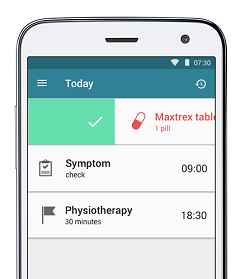Rheumatoid Arthritis? Learn How to Manage Your Mobility by Using an App to Help with Effective Symptom Control
There Is No Cure for Rheumatoid Arthritis, so the Goal of Treatment Is to Manage the Condition Effectively. Find out How MyTherapy Can Help You with Your Treatment ...

Rheumatoid arthritis (RA) is a lifelong, inflammatory condition that causes your bodily joints to become painfully inflamed and swollen. It can also cause damage to your skin, eyes, lungs, heart, and blood vessels. In the long run, the disease can lead to joint degeneration and deformities and if it spreads to other areas of the body, it can also cause heart attacks and strokes (although this isn’t common). RA is an autoimmune disorder, meaning that your body mistakenly attacks its own tissues. Although there is no cure for the condition, new types of medication have improved treatment options and the outlook for those living with RA. With the right treatment, you can ease your symptoms, slow the progression of the disease, and reduce the risk of complications. However, it goes without saying that treatment only works if you adhere to it strictly. Smartphone health apps can help you with medication adherence, thereby helping you control your RA.
If you are living with a chronic condition like rheumatoid arthritis, then you should consider using MyTherapy. The app is designed for people who have to take chronic medication and it is proven to increase medication adherence rates significantly. MyTherapy can offer you support in several ways. Firstly, it generates medication reminders that specify the exact timing and dosage of important medications that you need to take as per prescribed instructions. To upload your medication, you simply need to scan the barcode of your medication packaging using the app’s built-in barcode scanner. You also have the option to search for your medication in the app’s country-by-country database. Once you have uploaded your medication, the app will remind you to take your medication via both an alarm (which can be set to vibrate or silent) and a pop-up notification. These reminder features simplify your tasks into a to-do list.
Secondly, MyTherapy comes with a built-in digital health diary that you can use to monitor your symptoms as well as various health measurements such as your weight or the amount of C-reactive protein in your blood. You also have the option to record results from lab tests. By consistently keeping track of your health, you will be able to monitor your RA and evaluate whether your treatment plan is working or if your doctor needs to make adjustments. All the information logged into the app can be shared with your doctor if you so wish, meaning that you can work closely with him/her to achieve the most effective treatment for you. And don't worry about your data - MyTherapy adheres to strict German privacy laws and the team behind the app ensure that your data is always protected.
Apart from the medication reminders and the health diary, MyTherapy includes various other helpful features such as the possibility to generate reminders for doctors' or physiotherapy appointments. The app is easy to understand and simple to use because it is constantly being developed by user feedback. The app is tailored to meet your needs and can be used by anyone, of any age.
What Is Rheumatoid Arthritis?
Rheumatoid arthritis (RA) is a chronic inflammatory condition that affects the joints, causing them to become painfully stiff and inflamed. Unlike osteoarthritis where the damage is mainly due to wear and tear, RA affects the lining of the joints and causes a painful swelling that can lead to bone erosion and joint deformities.
RA is an autoimmune disease. This means that the body’s immune system, which normally attacks foreign materials like bacteria or viruses, mistakenly attacks the lining of the joints, causing them to become inflamed. This inflammation leads to the thickening of the synovium, which is a tissue that lines the inside of the joints and produces lubrication fluid to allow for smooth movement. It is this thickening of the synovium that makes the joints swollen and painful. Although RA mostly affects the joints of the hands, feet and wrists; it can also cause damage to other parts of the body, including the eyes, mouth, and lungs. Usually the effects of RA are symmetrical: for example, if one wrist is affected, the other one is affected too.
About 400,000 people in the UK are affected by RA and it is the most second common form of arthritis in the UK. The condition can affect adults of any age, but it mostly develops in adults between the ages of 40 and 50. It is also more common in women.
Risk Factors
As with most autoimmune diseases, it is not clear what causes rheumatoid arthritis. However, various risk factors have been identified that can increase your chance of developing RA. These factors include:
- Smoking
- Eating a lot of red meat
- Drinking a lot of coffee
- Exposure to certain substances, like asbestos and silica
- Being overweight
There is also some evidence that the condition can be inherited, but genetic factors alone do not cause the condition. Some scientists also believe that RA is caused by differences in hormones, particularly the hormone estrogen. This is because women, who have higher levels of estrogen, are more affected by RA than men.
Cold weather can aggravate the condition, but it does not cause it.
What Are the Signs and Symptoms?
In the initial stages, RA usually affects the smaller joints, like the joints of the fingers and toes. As the disease progresses, larger joints - such as those of the wrists, knees, elbows, ankles, shoulder, and hips - become affected. Generally, the signs and symptoms of RA include:
- Joint pain and swelling
- Stiff joints
- Swollen, warm, and tender joints
- Tiredness, irritability
- Anaemia
- Flu-like symptoms
Less common symptoms include:
- Weight loss
- Inflammation of the eyes
- Rheumatoid nodules (lumps below the elbows or on hands and feet)
- Inflammation of other body parts (such as the lungs, blood vessels, and the membrane around the heart)
RA usually starts quite slowly and varies from person to person. If you experience any of these symptoms, you should see a doctor as soon as possible. RA is difficult to diagnose, especially in the early stages, because its symptoms are similar to many other diseases. There is also no single diagnostic test for RA. In most cases, the doctor will diagnose RA by performing a physical examination and doing various blood tests, X-rays, and scans to exclude other conditions that may be causing the symptoms. Tests include checking the blood for erythrocyte sedimentation rate (ESR rate) or C-reactive protein (CRP), as these tests measure inflammation. Blood tests can also detect rheumatoid factor, which is an antibody produced by a reaction to your immune system. Another antibody test (the anti-cyclic citrullinated peptide test) can also be used to diagnose RA. People who test positive for both rheumatoid factor and anti-cyclic citrullinated peptide are likely to develop severe RA.
Taking Medication to Manage Rheumatoid Arthritis
Unfortunately, RA is a lifelong condition and cannot be cured. However, it is possible to manage the symptoms and slow down the progression of the condition with various types of medication. These are usually divided into two categories: disease-modifying anti-rheumatic drugs (DMARDs) and biological treatments. The medications can have various side-effects and it may take some time to find the one that suits you best.
DMARDs are very effective when it comes to easing the symptoms and slowing down the progression of RA. They block certain chemicals that are released when the immune system attacks the joints. The most common DMARD used is called methotrexate, but other known DMARDs include leflunomide, hydroxychloroquine, and sulfasalazine.
Biological treatments work by preventing certain substances in the blood from activating the immune system to attack the joints. They are a newer form of medication and are usually given as an injection. Biological agents include etanercept, infliximab, adalimumab, certolizumab, golimumab, rituximab, and abatacept.
In addition to the DMARDs and biological treatments, medication to manage the pain and inflammation may be necessary. These include nonsteroidal anti-inflammatory drugs (NSAIDs) and corticosteroids.
Apart from medication, physiotherapy and occupational therapy may be recommended to improve fitness, flexibility, and muscle strength. Surgery may also be an option for more severe cases of RA.
Most people with RA need to take more than one type of medication. A typical combination includes a painkiller, an NSAID, and one or more DMARD(s). Your treatment plan may be altered now and again depending on how the condition is progressing or any lifestyle changes you’ve recently made.
Maintain Mobility with MyTherapy
While there is currently no cure for rheumatoid arthritis, you can alleviate the symptoms and slow down its progression by taking various forms of medication and undergoing therapy. Adhering to medication isn’t always an easy task, especially when you have to follow a complex regimen. That’s why you should start using MyTherapy to support you on your health journey. With its reliable reminders that can be used for medication intake and appointments and its built-in health journal, which you can use to monitor your symptoms and track your condition, you can take your health into your own hands and make sure that you are getting the best results out of your treatment plan. And if you need added support, you can invite your family and friends on the app to help you stay in control of your RA. Try MyTherapy today and improve your quality of life.


